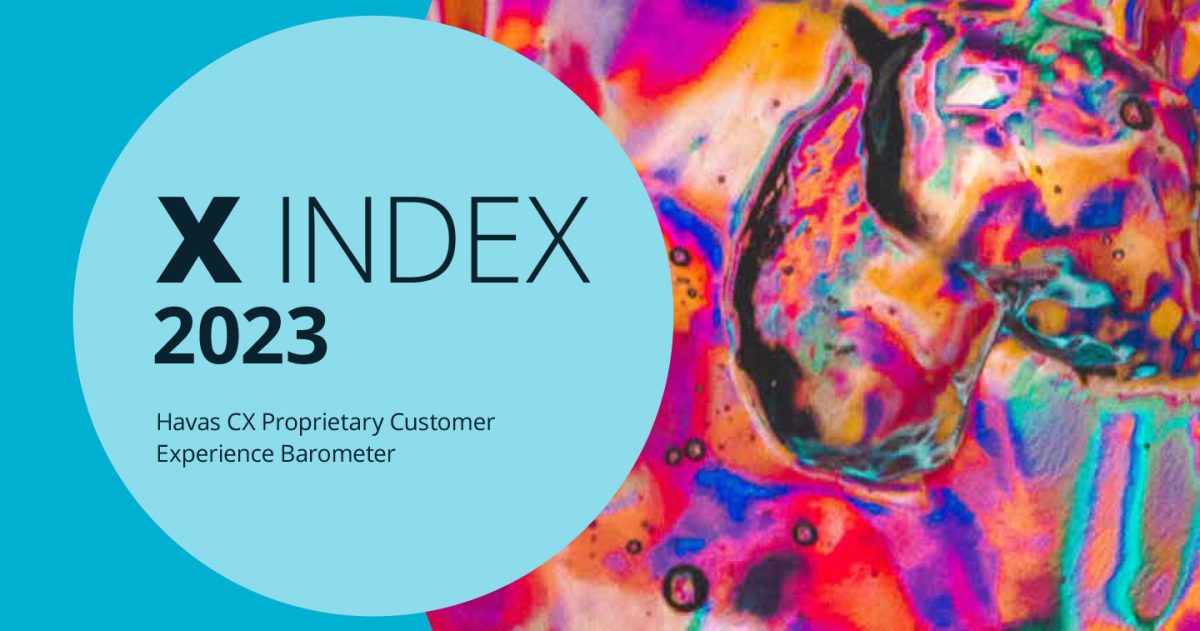MUMBAI, INDIA — The “X Index 2023” report by the Havas Group reports that in India, while brands have made strides in addressing key expectations from customers, there is still a long way to go before they reach pre-pandemic levels to create the most meaningful customer experience. The X Index 2023 India report is the proprietary customer experience barometer by t havascx.com, the specialized customer experience unit of Havas Creative Group India, which was launched in October 2020. Havas CX spans 18 of its major Villages worldwide, with key hubs in London, Paris, New York, and Mumbai. It’s a powerhouse of experts playing a critical role in digital transformation, design, customer experience and engagement, ecommerce, and much more.
After Covid-19, consumers still grapple with collective global challenges, from inflation and climate change to political unrest due to the Ukraine war and other uncertainties, so their expectations for brand experiences are higher than ever. As the X Index 2023 report reveals, we are in the “Era of Hyper Experience,” where consumers have the highest expectations from brands across every touch point, from meeting efficiency needs to creating a superior emotional experience.
The X Index, now in its fifth year, features a proprietary research tool that helps determine and measure the most critical factors in customer experience. The 2023 X Index applied a new methodology across the survey of 54,000 consumers in 10 global markets (U.S., U.K., France, China, Mexico, India, Italy, Germany, Portugal, and Spain) to evaluate the customer experience performance of 500 brands. This year, the X Index introduced 24 metrics to measure what criteria, across functional, emotional, personal, and collective factors, can create a compelling customer experience. It examined customer experience with bricks clicks brands, retailers that maintain brick-and-mortar stores in addition to selling online, and pure players, Internet-only retailers. The X Index also included a scorecard where consumers evaluated how well brands meet different experience touchpoints throughout the consumer journey, from social media to after-sale service.
As per the report, four key measures define customer experience: Functional, Emotional, Personal, and Collective. Examining the weight given to all four aspects of the purchase experience, we can discern that the 10 markets surveyed break into three clusters.
In the first cluster, we have five European markets (France, Italy, Portugal, Spain, and the United Kingdom) that give the most weight to efficiency and ease. Consumers in these markets prioritize hassle-free shopping and competent customer service. In the second cluster, we find a mix of highly developed and emerging markets: Germany, India, Mexico, and the United States. In these countries, shoppers want to feel engaged and delighted. They value the experience of shopping almost as much as what ends up in their carts. Of the 10 countries surveyed, China stands out for its heightened emphasis on personal experiences. Chinese consumers want to be respected and rewarded by their brand partners. They have a keen interest in feeling valued as individuals, not merely as shoppers.
In the previous X Index barometer, India was the only country with a lower score than the previous period & identified key factors to reverse the degrowth. This meant that Indian brands were not as agile in keeping up with the rising customer expectations. In the time since there’s been an appreciable increase in the average scoring for the market. This indicates that brands have made strides in addressing key expectations from customers. However, there’s still a long way to go before we reach pre-pandemic levels, indicating that while we’ve made strides forward, expectations of brands have only gotten bigger.
For Indians, the three defining elements of customer experience that drive satisfaction are:
- Differentiated experiences are paramount — The single most impactful element of CX across players in India were those who provide unique, novel, or innovative experiences for their customers. This is a pattern not seen in the other markets;
- It matters that brands build communities and treat their employees right — While other markets expect brands to provide inclusive experiences for differently-abled customers and showcase that they care about the impact the brand has on the environment, Indians prioritize being included as a part of a larger community and that the brand shows that they care for and treat their employees well;
- Help them learn through the brand experience and content — When it comes to personal factors we once again see interesting differences emerge in what’s expected of brands. While the expectation that brands know who they are is common across markets, what makes India unique is that across the 10 markets, we are one of only 2 markets (the other one being China) that expect brands to help us learn new things through their experience and content.
Tarun Jha, CEO of Havas Creative India, said, “In these times when sophisticated algorithms fuel customer experience, brands that want to create top-of-mind recall and earn their consumers’ loyalty must go far beyond impeccable service and instead create hyper-experiences that offer both efficiency as well as emotional connect. Today, consumers are spoilt for choice, hence only brands that can successfully create meaningful interactions will win. Data has to be optimized and used smartly, and the name of the game is no longer just about connecting with consumers but also creating communities that give them a sense of belonging. Our proprietary tool, X Index serves as a global barometer to measure and maximize customer experience hence proving to be indispensable for brands that want their customers to have the best-in-class experience.”
Prashant Tekwani, Managing Partner of Havas CX India, said, “In India, CX continues to be emotional and building meaningful relationships is paramount. The era of hyper-experience demands a perfect blend of efficiency, pleasure, hyper-personalization, and community-driven experiences. Havas CX’s X Index report, now in its 5th year, has been crucial in helping our clients stay ahead of the curve and navigate the ever-evolving landscape of customer expectations. This year, we are pleased to see that brands have clawed back CX satisfaction scores, as they work towards keeping up with the evolving customer expectations.”
Like in past X Index barometers, Indians continue to value the relationships they form with brands. They continue to want brands to engage in interactions that make them feel valued as customers, but this now comes with an added layer with an expectation that this be a relationship that also manifests at a community level.
According to the report, the top 10 brands in India that offer the best customer experience are Airbnb, at the top spot, followed by NEXA, Hyundai, UTI Mutual Fund, DBS Bank, Digit, Tata Cliq, Citroen, AJIO.com, and Nike.
The X Index 2023 report also identifies three key principles for brands to create a best-in-class “Hyper Experience:”
Make no compromise between efficiency and pleasure
To deliver the best customer experience, brands must be efficient and help customers not waste their time, which consumers ranked as their number one criterion for six pure players across all ten countries. They also value brands that make it easy for them to find what they’re looking for, and answer their requests promptly. In nine of 10 markets, consumers rated brands higher on efficiency than pleasure, so brands have room to improve their emotional connections with their audience. X Index findings point to the importance of an enjoyable and engaging in-store or online experience, and going beyond customers’ expectations. Finally, customers prefer brands that bring pleasant surprises into the journey between customer and brand, which was chosen within the top ten in all countries.
Balance personalization and privacy
Customer data can help brands reach extraordinary levels of personalization and offer an exceptional product and service experience, but customers expect brands to protect their personal information. Amongst the consumer experience criteria that customers ranked in their top 10, respecting privacy and personal data was important to consumers in seven out of ten countries, taking advice and feedback into account was ranked highly in four countries, and acknowledging and rewarding customers’ loyalty also made it to the top ten in four countries. Interestingly, grades on this criterion are significantly lower than global average in all countries, suggesting that brands still have a long way to go to satisfy customers on CRM programs and loyalty.
Offer an equal and accessible community experience
Brand experiences have the opportunity to create community by giving access to all. Consumers in 70% of countries said that it’s crucial that brands embrace diversity and also believe that brands should go above and beyond to guarantee the in-store and online experience is user-friendly for people with disabilities.








